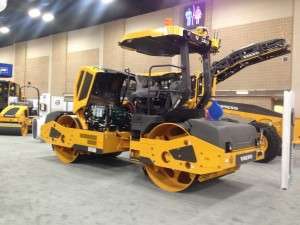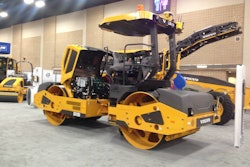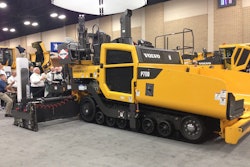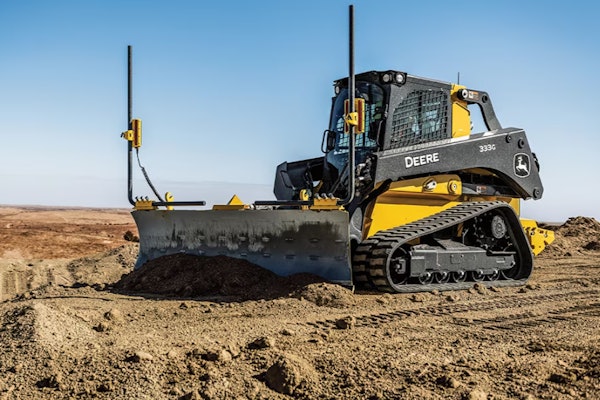 Volvo gave World of Asphalt attendees a sneak peak at the DD110B roller. It begins shipping in 45 days.
Volvo gave World of Asphalt attendees a sneak peak at the DD110B roller. It begins shipping in 45 days.If any industry sews nostalgia into every stitch of its fabric, it’s ours.
Equipment from days gone by is still part of the landscape and so are the names that were branded on it. Whether it is because previous generations of your family that owned the company began the business with it or because the department used that equipment in the great old days, the fact that time and business left names and products behind doesn’t dim their appeal.
It’s there, much like a family history where our predecessors determine much of who we are.
At World of Asphalt in San Antonio, Volvo is introducing some very impressive new equipment. The two standouts are the DD110B roller (shipping soon) and the P7110 paver (starts production April 1). Both are Volvo from stem to stern, but within them are the ghosts of Ingersoll Rand.
Volvo of course bought IR a few years back. In the new roller and the new paver at the WOA show there is no sign of IR to the naked eye. But the company is there.
The DD110B roller is now a completely Volvo product (it’s the next generation of the DD9) as are the 7110 tracked paver and the 7170 wheeled paver. The roller has more in its drums than before. More frequency, amplitude and centrifugal force. The drums are lighter with more diameter and the power plant is no longer Cummins but Volvo’s own Tier IV interim engines.
The pavers are Volvo from the drawing board to the ready-to-pave model on the WOA show floor. They have been undergoing testing for two years now and come with more than 200 changes from its predecessor. I love the simple stuff: a hood with glare-resistant paint and the fact that the hood can be opened with kick.
What has happened is that Volvo has kept moving ahead, and the old IR parts, pieces and systems have been subsumed in the process.
But they have not been abandoned, they have been improved. Volvo’s Bob Marcum says the company continues to develop as many common bases as possible, such as a cab (or any other part) that can be used in a variety of equipment. But Volvo stops short of imposing a product. In other words, parts share commonality as long as they aid the operator. Beyond that, where they might be a negative, they are replaced by advances designed for that machine only.
What I like about this is that as Volvo continues to improve generation after generation, somewhere down in the belly of the beasts they make are parts and designs that stand the test of time, that keep working. That don’t need to be replaced with something new just for the sake of it and provide a solid base to build.
They’re Volvo parts but the family history shows the IR contribution.
So not only do the old machines and their makers linger on in the industry’s psyche, they keep working, and this is an industry that is, to my delight I have to say, pragmatically willing to stick with what works rather than turn to institutionalized gimmickry.












